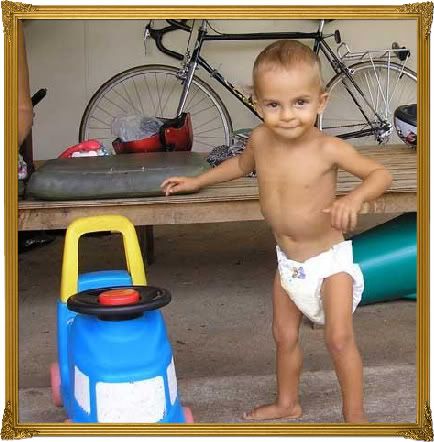
|
|

There has been a lot of publicity about babies ,who have been fed a fruit diet ,having serious health problems. I can only speak for myself and my two beautiful fruity babes and share our fine experiences on a fruit diet. What I feel is sooo important is that a wee babe is a milk machine ; he or she lives, loves, thrives and smiles all the while being fuelled by milk. When I say milk, I refer to mamma's milk not cow, soy, goat or the strange concoction that comes in a tin and is labelled 'formula'. Babies need only good quality milk from their mother or a wet nurse for the first months of their lives. I believe that where fruity babies may run into trouble is if the milk they receive is not of good quality or the baby is weaned prematurely.
The mother needs to be on a good fruit diet with plenty of top quality organic, wild or home-grown fruits. As woman does not live by fruit alone, the mother also needs plenty of rest, positive thoughts, support and love during the nursing period. She is doing a very important job that should be recognised by all around her.
When is a baby ready to try fruit in addition to her milk? I believe all children are different and basically they know themselves when they are ready. My elder son showed no interest in fruit even at seven months. My younger son however was reaching out to share my fruit at three and a half months. I believe that in a natural jungle setting, how our distant fruitarian ancestors would have lived, then a baby reaching out for fruit would get fruit. The small infant holding on to his mum or dad as they climbed the tree would only have to put out his or her paw and grab some of the fruit from the tree from which their carer was foraging. I cannot believe that our frugivore forebears would try to stop the infant from feeding him or herself any more than a mamma deer would stop her fawn from eating the grass.
So as long as the baby physically shows a strong urge to grab fruit and try it, I would say they are ready to start experimenting. Physically, a baby could grab a candy bar too or a loaf of bread but these would not have been hanging from the trees , like a ripe mango or a creamy cherimoya! As milk is so important to children, for I believe the first three to four years, this raises other issues that go beyond diet. For example, it means the mother must be happy to breastfeed for a period deemed unusual in today's society. People are often offended or shocked by seeing a toddler breastfed. Because of our reliance on cows' milk it is rare for anyone to feed their babies beyond the second year. In societies where dairy is not traditionally used, for example Ancient China, then it is usual for infants to be breast fed for the first four years.
It is a special commitment for the mother to undertake to feed her child for an extended period, it may make returning to work or using daycare facilities more of a challenge. I feel that mothers who make that commitment to feed their child long-term are doing a very special thing both for the welfare of the child and for the welfare of society.

My two fruitarian babies have both have excellent health and happiness. No usual childhood ills, happy and lovely natures and a joy to raise.
A Selection of Some Fabulous First Foods for Babes:
Mangoes, Papaya, Ripe Persimmon, De-seeded Cheyimoya.
And a Little Time Later You Could Try...
Ripe Pear, Ripe Banana, Mamy Sapote and all the other little Sapotes: Canistel (yellow sapote), Chocolate Sapote, Green Sapote, White Sapote, Avocado, Durian, Cherries, Fresh Figs Jackfruit.
When Teeth Debut:
Apple, Pineapple, Hard Pears. Grapes. For something to chew on when teeth are coming through, hard pear slices are good. Also unsulphured dried apple rings are nice to chew on. They are less sweet than most other dried fruit.
Dried fruit, I believe is best used sparingly, especially with infants. It has undergone some processing and is a concentrated food source. Dried fruit can be useful however, when good fresh fruit is in short supply. If the dried fruit is sundried or air dried at low temperatures it will retain enzyme activity. Dried fruit can be soaked in pure water to re-activate the enzymes and make it less concentrated. A few hours soaking is usually sufficient. Dried fruit , I believe is best eaten only if it is unsulphured. Sulphur Dioxide(220) is an additive used in the processing of dried fruit. It is used to keep the colour of the fruit. That is why dried apricots that have been sulphured are an orange colour and unsulphured ones are brown.
Sulphur Dioxide destroys the B vitamins while adding no real benefit to the value of the fruit. Potassium Sorbate (202) is also added to dried fruit. It enables the fruit, usually prunes or figs, to retain moisture and still keep. The only way a dried fruit can retain moisture ,and not go bad ,is if the enzymes have been destroyed. This is because if water and enzymes are both present then the enzymes will not be inactive and the fruit would start to go off. So any dried fruit containing moisture or Potassium Sorbate will not contain enzymes!
Fruit for babies needs to be of the grandest quality, the fresher and better grown the fruit then the more nutrients and life-force it will contain. I have raised two very healthy babies on a mama's milk and fruit diet but I had to make sure that they were getting a good selection of top quality fruit and I was too , to create a good milk supply.
A Weighty Matter?
Fruit eating, mother's milk -drinking babies are slim and lean. They appear very different in appearance from babies on other diets. The image of a 'healthy' baby in Western Society is one with rolls of adipose tissue. But is this healthy?
Arnold Ehret, a fruitarian writer whose works I greatly respect, says of babies on a standard diet, "What is seen as healthy is in reality pounds and pounds of decayed waste."
All other primates, whom anatomically we closely resemble , have lean offspring. Gorilla babies , Orangatang babies, and Gibbon babies are all slim ,with a naturally nicely muscled physique. From a survival point of view this makes good sense. A few thousand years ago humans, along with the primates, would carry their young everywhere. How could humans possibly run away from danger or climb fruit trees whilst carrying a really heavy baby? The only reason that babies have been allowed to get so fat is that pushchairs, prams and car seats have been invented.
If we had to carry babies everywhere it would be a different story. I really fail to see the survival advantage of a fat baby. Allopathic doctors say that it is good to have a fat reserve in case the baby gets ill. A fruitarian baby eating great quality fruit and mama's milk has a much lesser chance of getting ill. Also if a fruitarian baby is ill they will have a supply of good quality mother's milk to ensure that they continue to receive a good source of nutrition. The less stored toxins that are in a baby's system, the better they will deal with any disease and the less likely they will be to go through a detox, if they are eating less. To go to Home Page please click here.